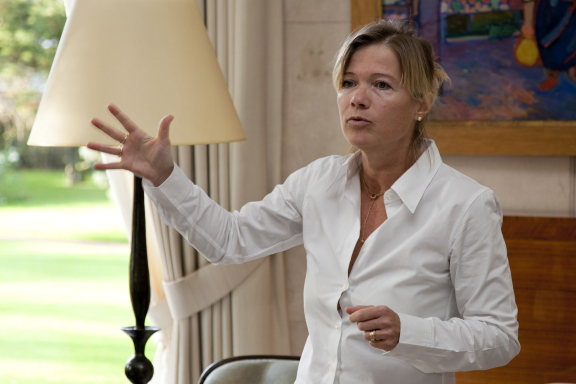Anne Eichmann Controlling our blood vessels
Anne Eichmann, Inserm Research Director, Embryonic and Pathological Angiogenesis Unit, Collège de France
- 2009 • Liliane Bettencourt Prize for Life Sciences

What if we could control the development of our blood vessels? Thanks to Anne Eichmann’s research, this may well be possible in the future. By combining neurobiology and vascular biology, she is dissecting the mechanisms that enable the human body to form certain cells.
Is the development of blood vessel a sign of danger?
Blood vessels, essential to an organism’s survival, are fully formed during embryonic development. As a result, the proliferation in adults of endothelial cells, which line the interior of veins and arteries, is not usually a good sign. In most cases, this process is associated with disease. For example, this proliferation occurs when these cells develop around a tumour. Understanding what causes this dysfunction, or even discovering how to counteract it, would thus be a major advantage in developing effective treatment.
Vascular growth under the microscope
Anne Eichmann has been advancing our understanding of vascular development for many years. Her work lies at the frontier between two rapidly growing disciplines: vascular biology and neurobiology. By combining these two fields of research, she has shed light on the similarities between the nervous and vascular systems, thus facilitating the discovery of new therapeutic targets. She has discovered several cell receptors that respond to vascular endothelial growth factor (VEGF). These receptors are now the target of several chemotherapy agents. Anti-VEGF agents block tumour-induced vascular growth and “starve” tumours, thereby inhibiting their development.
The Foundation’s support
Since being awarded the Liliane Bettencourt Prize for Life Sciences, Professor Eichmann and her team have been able to further explore these promising avenues for research. Their current research work is based on the discovery of “tip cells”. These cells, which are growth specialists, are located at the tips of blood vessels. The researchers are particularly focused on the molecules that control the growth of tip cells on capillaries. This research heralds the dawning of a new understanding of how the vascular and nervous systems are formed. For example, if the mechanisms involved could be controlled, the growth of blood vessels around tumours could be prevented or, on the contrary, induced to repair damage in a specific area.
Anne Eichmann in a few words
Anne Eichmann was considering a career as a veterinary surgeon and began her studies in this field in Berlin (Germany). She obtained her PhD in cellular and molecular biology in Paris. While conducting post-doctoral research with Nicole le Douarin at the Institut d’embryologie (Nogent-sur-Marne), she isolated the hemangioblast, a common precursor of endothelial and hematopoietic (blood) cells, in mouse embryos. Her work lies at the interface between vascular biology and neurobiology, and involves using unique mutant mice developed with her team. Today, she is focusing on the interactions between the nervous and vascular systems and the diseases that affect them, such as diabetes.
-
1994 PhD in Cellular and Molecular Biology, Sorbonne Paris North University
-
1994 Post-Doctoral Fellowship in the laboratory of Professor Nicole Le Douarin, Institute of Embryology, Nogent-sur-Marne
-
1997 CNRS Researcher, 1st Class
-
2002 CNRS Research Director, 2nd Class, Collège de France, Paris
-
2005 Inserm Research Director, 2nd Class, Collège de France, Paris
-
2007 Inserm Research Director, 1st Class, Embryonic and Pathological Angiogenesis Unit, Collège de France
-
2009 Liliane Bettencourt Prize for Life Sciences
Liliane Bettencourt Prize for Life Sciences
The Liliane Bettencourt Prize for Life Sciences rewards each year a researcher under the age of 45 for the excellence of their work and their remarkable contribution to their field of scientific research. This prize is awarded, depending on the year, to a researcher based in France or working in another European country. Thirty winners have been awarded since 1997. From 2023, prize rewards the laureate up to 100,000 euros.
All the award-winnersCall for applications
The 2025 edition of the prize will be awarded to a European researcher working in France. The call for candidates among selected scientists will be launched from January 6 to February 28, 2025. Nominated candidates will be invited to submit their applications between March 3 and April 21, 2025.